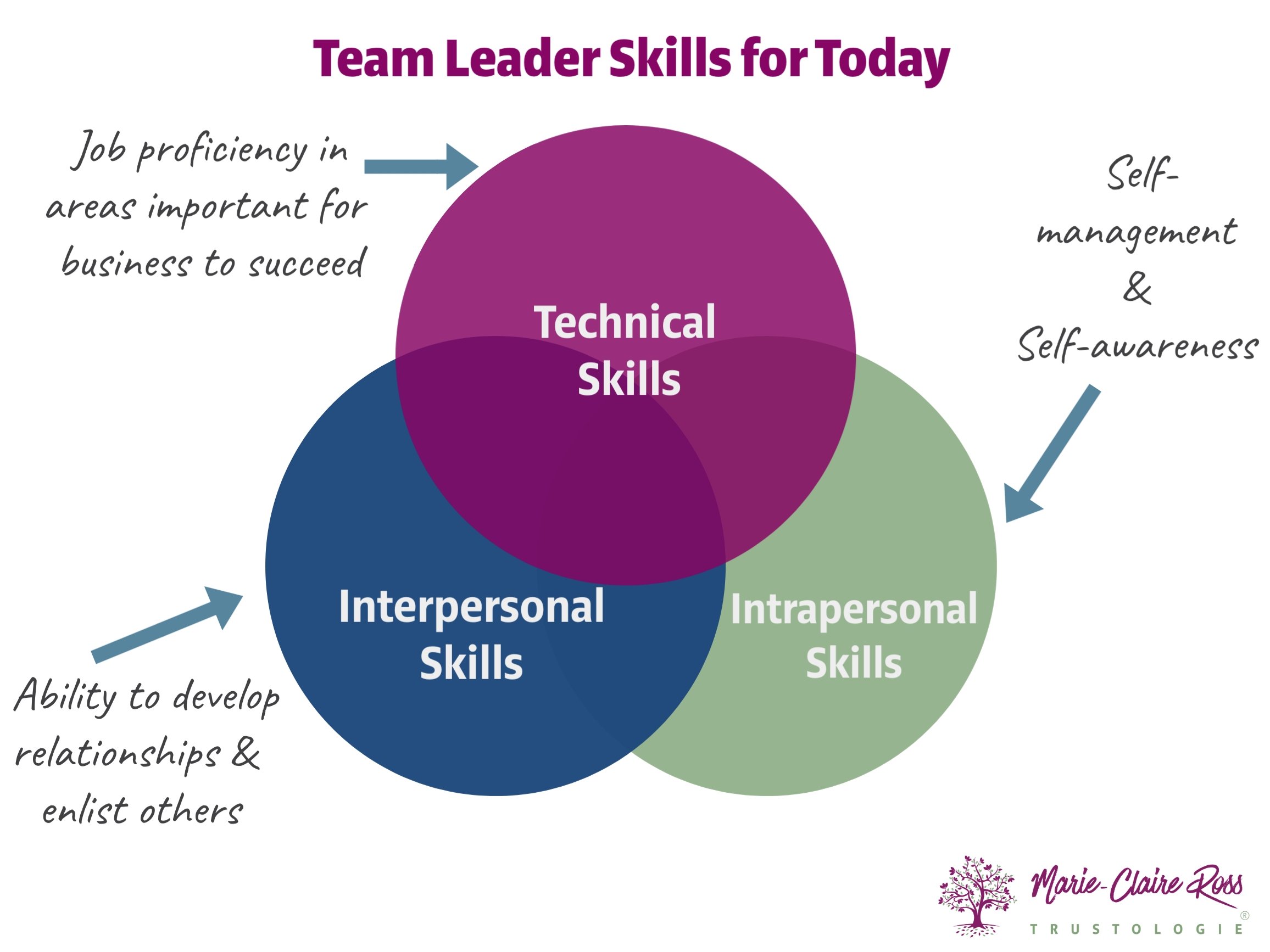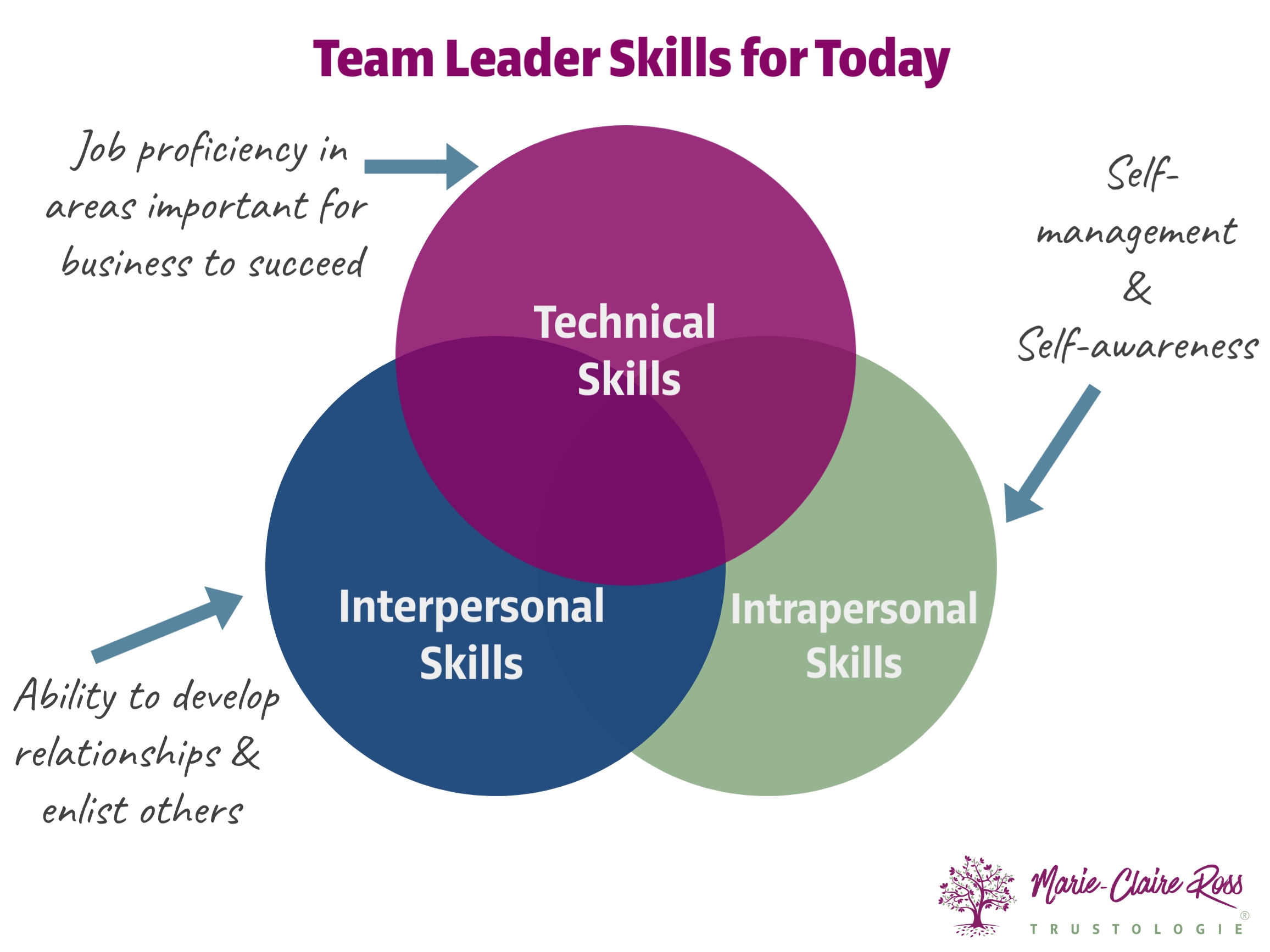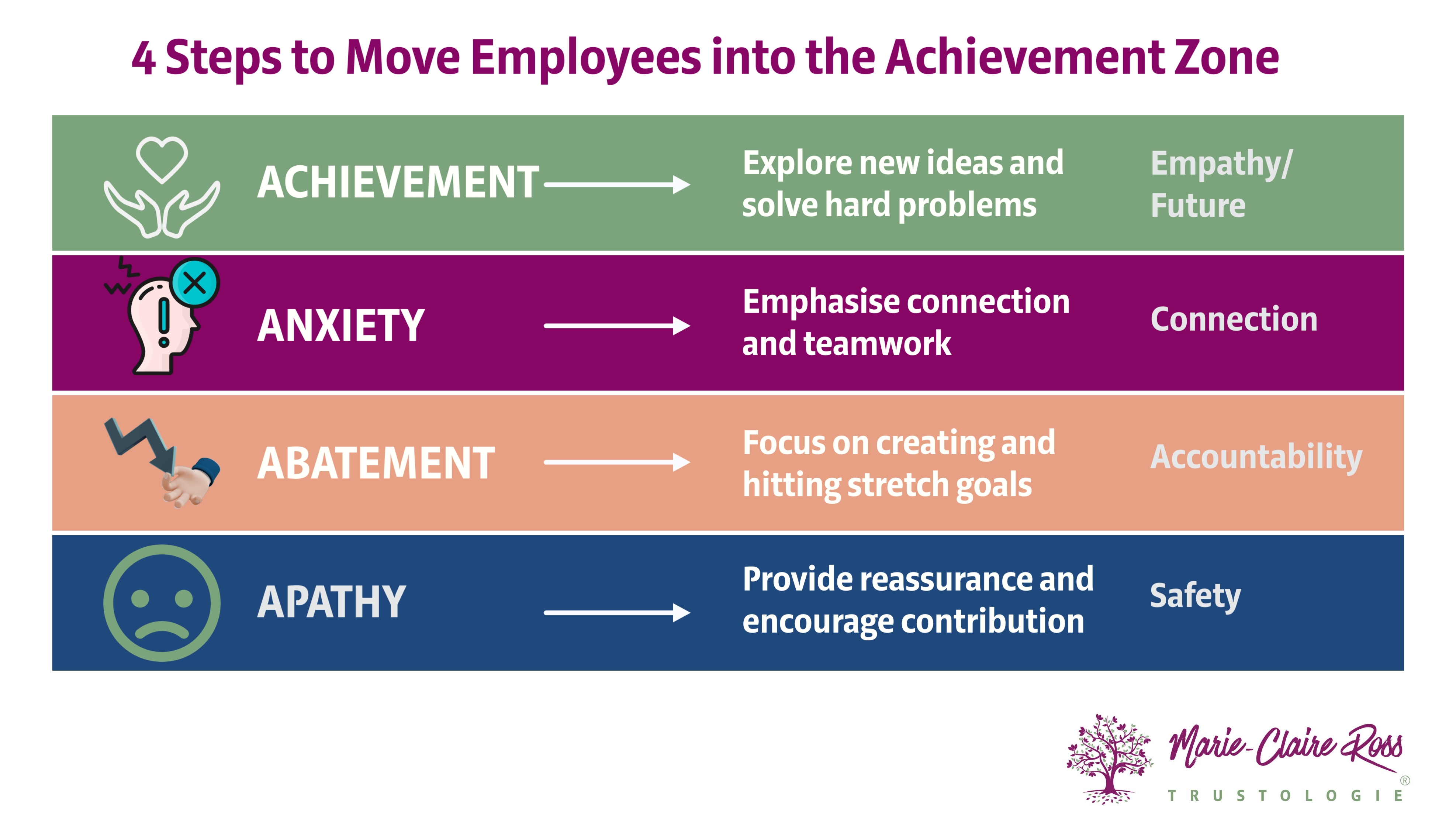11 min read
4 Practical Strategies for Better Emotional Management in the Workplace
I have a friend who often finds herself at the mercy of her emotions. Recently, she called me to rehash a confrontation she’d had with a group of...
Develop leaders, strengthen executive teams and gain deep insights with assessments designed to accelerate trust and performance.

Transform how your leaders think and perform with keynotes that spark connection, trust and high-performance cultures.

Explore practical tools, thought-leadership and resources to help you build trusted, high-performing teams.

Trustologie® is a leadership development consultancy founded by Marie-Claire Ross, specialising in helping executives and managers build high-trust, high-performing teams.

7 min read
Marie-Claire Ross : February 4, 2025

Sounds easy, right?
Research conducted by CEB shows that 60% of all new managers fail within the first 24 months of their new position. The primary reason for this failure is inadequate training in managing people from the start.
Of course, what new leaders discover pretty quickly is that learning to manage people takes time and a whole lot of effort.
Part of the problem is that our education system has fooled us into believing that work is all about our technical skills. The reality is technical expertise is not enough to manage people.
Instead our interpersonal and intrapersonal skills become more important. The reality is that to manage people well we need to work on our soft skills (which are actually really hard!)

Managing people requires knowing how to get the best out of them. It's about inspiring, and empowering employees to meet deadlines, do high quality work, treat others well and create a thriving team culture.
Yet, we sometimes misunderstand the serious importance people and management has to the success of not only teams, but the organisation itself.
A high 70% of what a leader says or does has the ability to influence people's wellbeing, employee engagement, retention, ability to collaborate and reach their full potential.
In a rapidly evolving business environment, managers with strong people skills are better equipped to lead their teams through change and drive organisational success.
So let's take a look at some of the most important soft skills in managing people (broken down into Intrapersonal and Interpersonal skills).
Intrapersonal skills are about how we manage our selves and our self-awareness. These are our internal abilities such as how with deal with challenges, how we take in information and how we process emotions. Out of all of the skills, this is the hardest one to learn. Mainly because it means understanding ourselves - a core part of emotional intelligence. Here are the main intrapersonal skills leaders need for managing people:
Trusting ourselves is foundational to our ability to lead. It impacts how we lead our teams, the performance of our direct reports, how other leaders view us and how we cope with change and pressure.
It requires working on our self-awareness and believing that no matter what happens we have the ability to figure it out.
Develop a deeper understanding of your leadership style, strengths, and areas for growth—this is key to becoming an exceptional people manager. Consider getting a leadership coach to help.
Reflection: What do you need to learn to trust yourself to be more effective at managing people?
Transitioning from being an individual contributor to focusing on the team's collective abilities often brings up trust issues. All of a sudden you have to lean on others to get things done well. It's tricky because what new leaders find is that other people are motivated by different things to them.
Managing people requires a totally different mindset with different behaviours to match.
Employees gain trust in you when they see that you will support them even when they make mistakes. More importantly, they will trust you when they see you aren't negatively judging them and that you are confident in their abilities. Especially, when you can't see them working.
Leaders who lack self-confidence often second-guess their decisions, struggle to project assurance, and provide unclear instructions and expectations. This can lead to increased control and micromanagement, which can make your team feel like you don't trust them.
Reflection: What do you need from others to trust them to do high-quality work?
It is common for well-meaning managers to be overwhelmed by their own or others' emotions.
Emotional self-regulation is the ability to recognise, understand, and manage emotions, and to channel those emotions into productive ways of thinking and acting.
The thing is we can't control how other people feel. Nor can we create a non-challenging, stable environment all of the time.
When we worry about everyone else around us, we are less effective. We are moving our focus from where it needs to be to all of the minor distractions around us.
All we can control is how we react and act. And sometimes this means allowing people to experience pain and frustration.
Emotionally intelligent leaders are more effective when they let people experience their own negative feelings and don't get dragged down into them. Likewise, they have learnt to control how they react to negative news.
Reflection: How do you react when you hear bad news? Are you able to manage your disappointment or frustration?
In order to know how we are performing, we need regular feedback, in order to motivate us to stay the course. When we don’t receive feedback, or receive it after an activity is performed poorly, it negatively impacts our self-confidence and sense of achievement.
Effective leaders seek regular from their boss and their colleagues. Receiving feedback fosters empathy and enhances your awareness of how your actions affect others.
If you aren't seeking real-time data and corrective feedback, your team is at risk of falling into the Abatement Zone.
Intentionally seeking specific feedback is a powerful tool to ensure effective leadership. Have some trusted feedback friends who have you best interests at heart who can regularly give you honest feedback.
Reflection: How do you feel when you are given unsolicited feedback? Do you get defensive or do you contemplate where you can improve?
INTERPERSONAL Skills
Interpersonal skills are the ability to develop and maintain relationships and enlist others. This means being able to communicate clear directives, a compelling vision and to provide actionable feedback to others.
It all comes down to effective communication through having a structured approach to leading impactful meetings, delegating, running effective one-on-ones, and providing constructive feedback with confidence.
One of the most important steps in building trust and connection in the workplace is to spend time understanding each individual we need to work with.
Have regular one-on-ones with each of your reports and peers. Ask incisive questions to uncover communication, work styles, and receiving feedback preferences, as well as career development plans and career goals. This will help you customise your communication to people both in and out of your team.
The more we understand others, the more we can unlock their potential and be seen as their supportive ally - not a roadblock.
It will also ensure that when you both face a difficult situation, you will have built the trust necessary between you and your report, so that they trust your intentions.
Reflection: How do you feel about your one-on-ones with your reports? Are they helping or hindering your relationship?
Meetings get a bad rap, but they are a wonderful opportunity to get people on the same page, remove confusion, problem-solve, learn collectively and highlight momentum.
They also provide a unique opportunity for team members to learn about one another and for team leaders to improve team performance.
Running engaging meetings is all about scheduling them at the right time, planning a clear outcome, having a meeting agenda and encouraging everyone to be involved.
Reflection: How do you feel about your meetings? Are they something that your reports look forward to attending and contributing in?
Great delegation is about being an accountability partner to help your report grow their capabilities.
It involves three steps:
Of course, what is most important is the mindset towards delegation. Most managers who are poor at delegating worry that they are overwhelming their staff with too much work. Or that they have to do the job because only they can do it well.
Neither of these approaches are beneficial for your mental health long-term or building trust in your team. Managing people means managing workloads and tasks. It is a key skill to get right and foster the environment for a high-performing teams.
If there is one crucial people management skill that first-time managers and even experienced managers struggle with the most, this is it. Aiming to provide feedback without fear can be a common goal for many business leaders who need to address poor performance.
Managers can be so scared of giving direct feedback that they end up talking around the problem, avoid it all together or give it too late. The infrequency of feedback means that employees miss out on continuous learning opportunities and professional growth. It also wastes a lot of time.
Structured feedback and performance management reviews are essential tools for managing people effectively. These are key skills to be able to effectively aim for conflict resolution. These processes also provide opportunities for managers to recognise achievements, address areas for improvement, and set individual goals.
Reflection: How do you feel after you have given some difficult feedback? What steps can you do to improve that?
Team leaders who know how to manage people well bring numerous benefits to both the organisation and its employees. For the firm, it means higher productivity, reduced employee turnover, and a more positive employee experience. For employees, it translates to better job satisfaction, opportunities for professional growth, and a supportive work environment.
For leaders themselves, it works towards them feeling that their making a difference to their employees lives and creating a team culture that they want to work in.
People management skills play a significant role in the success of an organisation. They influence how well teams work together, how effectively projects are completed, and how resilient an organisation is in the face of challenges.
Effective people managers work hard to develop their emotional intelligence, develop their own authentic management style and have learnt to trust themselves and others.
They do the work on their professional development, setting professional goals around improving their communication skills. They focus on regular face-to-face interactions with staff - one-on-ones, meetings, difficult conversations and delegation.
Leadership development is often considered a luxury, rather than a necessity. Often, organisations assume that leaders will "figure it out" on their own, without offering structured development programs or continuous support.
But the costs can be huge. Poor leadership erodes trust - leading to disengaged employees, high turnover rates, and diminished productivity, which directly impacts the bottom line.
Research from Training Industry indicates that for every dollar spent on leadership development, the return on investment (ROI) ranges from $3 to $11, averaging at $7. Leadership training should be viewed not as an unnecessary expense, but as an essential investment.
If you believe that, you or your people leaders, would benefit from strengthening leadership skills, then consider an evidence-based external leadership course. Tribe of Trusted Leaders - Leadership Development Program is a highly effective online course that covers how to lead yourself, your direct reports and your team. Learn proven framework and communication structures for team performance. Book a 30 minute strategy session to learn more.

11 min read
I have a friend who often finds herself at the mercy of her emotions. Recently, she called me to rehash a confrontation she’d had with a group of...

9 min read
True leadership presence isn’t a performance or a set of charisma hacks; it is the felt experience of who you are being in the room. By cultivating...

13 min read
As teams return from their summer (or winter) break, you may notice subtle shifts in your team’s energy. Even if the end of year was positive, a new...

I have a friend who often finds herself at the mercy of her emotions. Recently, she called me to rehash a confrontation she’d had with a group of...

Last week, we looked at three different arguments to convince senior management about why they need to care about safety.
-1.jpg)
The last couple of years have seen remarkable turbulence in both the global economy and workforces. The impact of COVID is still continuing to...